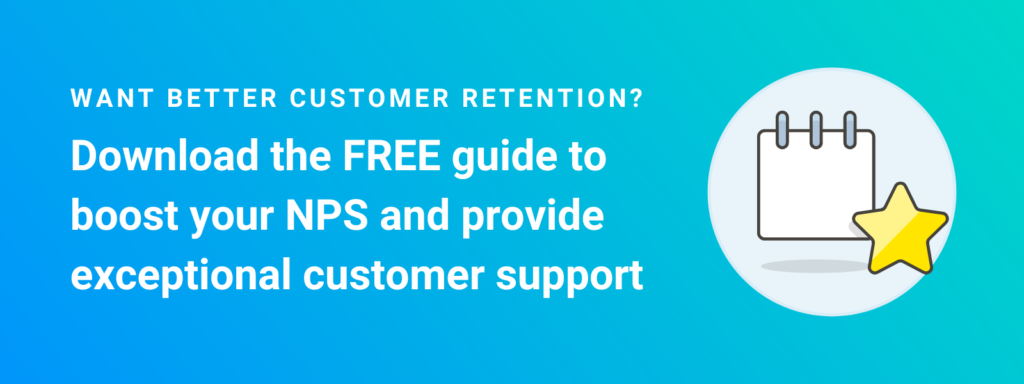Did you know that 84% of people trust online reviews as much as a personal recommendation? That means if your customers love your products, their reviews on popular websites and social media can spread like wildfire and skyrocket your business.
Therefore, collecting customer feedback is paramount, so you can quickly understand how they feel about your brand and identify areas for improvement. To measure this successfully, you’ll want to focus on a specific metric called net promoter score, also known as NPS. Below, we go over what NPS is, why it matters for your business and how to increase your company’s NPS.
Improve your team's NPS today with this free strategy guide
What is NPS?
NPS refers to how satisfied your customers are with your products or services and how likely they are to recommend them to someone else. NPS gives you critical insights into the health and success of your business. You should review your NPS quarterly to gauge overall business performance and identify any areas for improvement.
What is a good NPS?
Generally, a good NPS is anything above zero. However, to continue to grow a healthy and robust business, it’s advisable to aim higher. Most companies average an NPS of 44. Therefore, it may be advantageous to focus on increasing your score to 50 or higher, which is considered “excellent.” A score of 80, the highest a company can achieve, is considered “world class.”
How to calculate NPS
It’s important to calculate your NPS so you understand the health of your business and can identify gaps or areas for improvement. Below, we share how to calculate your NPS.
Survey your customers
Calculating NPS starts with a survey that asks customers one critical question: “On a scale of zero to 10, how likely are you to recommend our organization to a friend or colleague?”
Once customers have selected their answers, you can divide them into three categories that are critical to calculating your NPS:
Promoters: Customers who score their satisfaction as a nine or ten are your promoters. These people will recommend your products and services to their friends.
Passives: Respondents who score the likelihood of recommending your products as a seven or eight are called passives. These customers have neutral feelings about your products or services and aren’t likely to recommend or disparage your company.
Detractors: Customers who score their satisfaction much lower, typically from zero to six, are considered detractors. Not only are these customers unlikely to recommend your products or services, but they’re more likely to share their negative experiences with their friends.
Calculate the percentage of each category of customers
Once your customers have filled out your survey and you’ve sorted them into the three categories above, it’s time to calculate the percentages of promoters, passives and detractors. How many you have of each will affect your net promoter score.
For example, if you have a high number of promoters, your NPS will increase. However, if you have a lot of customers who are dissatisfied with your services, this will lower your NPS.
Calculating the percentage of each type of customer is simple. Here’s how to do it:
Promoter percentage = [Total number of promoters / total number of responses] x 100
Passive percentage = [Total number of passives / total number of responses] x 100
Detractor percentage = [Total number of detractors / total number of responses] x 100
Calculate your NPS
Now that you know the percentages of your promoters, passives and detractors, you’re ready to calculate your NPS. To do this, you’ll need to subtract the percentage of detractors from the percentage of promoters. It should look like this:
Net promoter score = The percentage of survey promoters - the percentage of survey detractors
After, you’ll be able to use your score to assess the health of your business. You can refer to the previous section to understand how your score compares to industry benchmarks.
Why improving NPS is critical for your business
NPS is critical for having a robust, sustainable business. Below, we detail a few reasons why NPS matters for the health of your business.
Reduce customer churn
Customer churn, also known as customer attrition, refers to the customers a business loses within a given time period. One important contributing factor to customer churn is poor customer service. In fact, 15% of customers cite poor customer service for discontinuing purchases with a company they were once loyal to.
Taking steps to increase your NPS, such as focusing on customer needs, evaluating self-serve options and providing contact center agents with the right tools will increase customer satisfaction. In turn, higher customer satisfaction will increase brand loyalty and aid in customer retention.
Turn customers into brand evangelists
By reducing customer churn and increasing customer satisfaction, your company will raise the number of brand promoters versus brand detractors. This is critical for increasing NPS. In turn, customers are more likely to recommend your business to friends, family and others.
This is also vital in the age of social media and online review sites. A customer sharing a positive experience with your brand on Twitter, LinkedIn or Meta (Facebook) can be viewed and shared by a wide audience. This can help increase brand recognition, facilitate brand trust and foster positive brand sentiment.
How to improve NPS
The higher your NPS, the healthier your business will be. But if your score is lower than you’d like, how do you increase it? Below, we share a few steps you can take.
Identify setbacks and customer needs
It’s necessary to identify setbacks and areas for improvement when it comes to improving your customer support. For example, do you have repeat callers who have been unable to find a resolution for their technical issue? The ability to resolve a customer’s problem within the first point of contact, known as first call resolution, is critical to customer satisfaction. Customer satisfaction is an integral factor in NPS.
A study by GetVoIP found that 67% of customers would stay with a company that resolved a technical issue within the first support request. The faster your company can help customers with their technical support inquiries, the happier your customers will be. This will increase customer satisfaction and the potential for those customers to become your brand promoters, thus increasing your NPS.
In addition, your company will also want to identify roadblocks for customers as well as their specific motivations or needs. By taking the time to understand the challenges your customers face, you can eliminate frustration and increase customer retention.
Evaluate your self-serve options
Some customers prefer to search for answers on their own to resolve any technical issues that arise. Therefore, it’s critical to assess the quality of your self-serve options. Does your business provide self-serve resources for customers to answer their own technical questions or learn about new features? Are your self-serve features WCAG 2.0 AA compliant, so customers of all abilities can access the necessary information?
In addition, you’ll want to evaluate the quality of the answers provided. It’s paramount that the information you provide to customers is regularly updated and accurate. This will not only make your customers happier, but will also help increase your NPS.
Make sure contact center teams are provided with the right tools
In addition to self-serve options, you’ll want to ensure your team is equipped with the right tools to assist customers with technical inquiries. The devices and apps that customers use change rapidly, and physical devices in contact centers can quickly become outdated.
In addition, customers may have multiple versions of the same device. This can be a challenge for contact center agents who may not be familiar with the most recent updates. Virtualization, however, can help contact center agents learn more about each device or app, along with any recent software updates or new features. This lets your agents provide personalized customer service, often resulting in higher customer satisfaction and increased NPS.
If you want to improve your NPS, be sure to provide accurate and up-to-date tech support solutions for agents that can be accessed through a variety of channels.
NPS provides key insights into the health of your business
NPS gives your business critical insights into customer satisfaction and business performance. Companies can increase NPS by focusing on customer needs, evaluating self-serve options and equipping contact center agents with the right tools to succeed in every customer interaction. Focusing on increasing NPS will help your business by reducing customer churn, increasing brand loyalty and turning customers into brand evangelists.
Are you looking for proven solutions to improve your NPS? Ozmo is a leading omnichannel tech support platform trusted by Verizon, TELUS, Asurion and more. Learn more about the future of customer service today!




